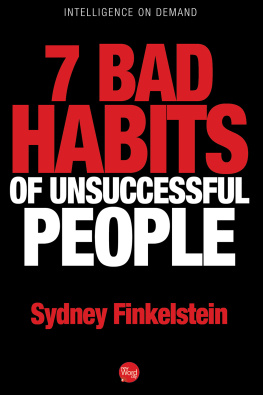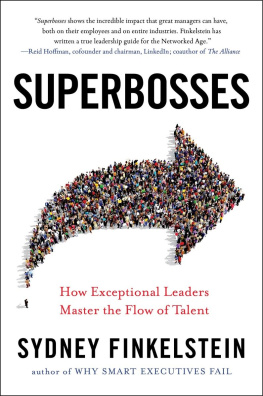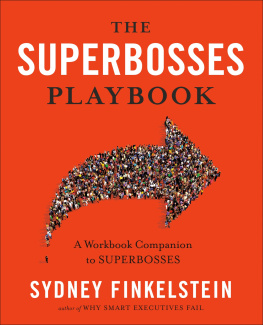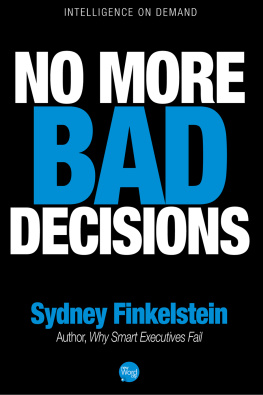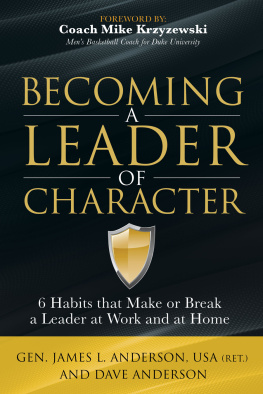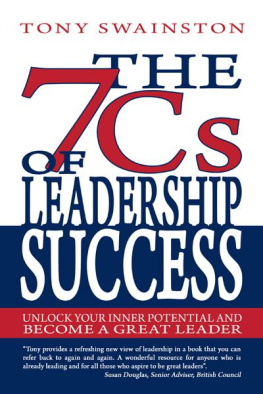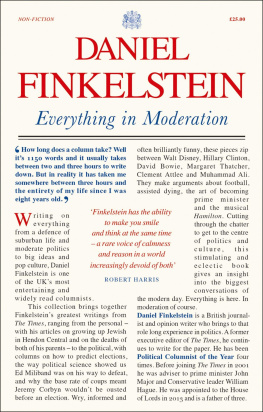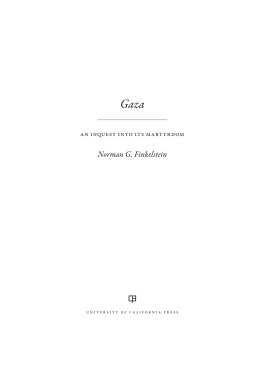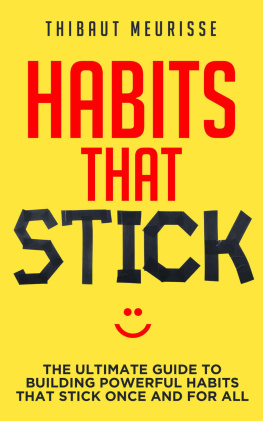Sydney Finkelstein - 7 Bad Habits of Unsuccessful People
Here you can read online Sydney Finkelstein - 7 Bad Habits of Unsuccessful People full text of the book (entire story) in english for free. Download pdf and epub, get meaning, cover and reviews about this ebook. year: 2014, publisher: New Word City, genre: Detective and thriller. Description of the work, (preface) as well as reviews are available. Best literature library LitArk.com created for fans of good reading and offers a wide selection of genres:
Romance novel
Science fiction
Adventure
Detective
Science
History
Home and family
Prose
Art
Politics
Computer
Non-fiction
Religion
Business
Children
Humor
Choose a favorite category and find really read worthwhile books. Enjoy immersion in the world of imagination, feel the emotions of the characters or learn something new for yourself, make an fascinating discovery.
- Book:7 Bad Habits of Unsuccessful People
- Author:
- Publisher:New Word City
- Genre:
- Year:2014
- Rating:5 / 5
- Favourites:Add to favourites
- Your mark:
- 100
- 1
- 2
- 3
- 4
- 5
7 Bad Habits of Unsuccessful People: summary, description and annotation
We offer to read an annotation, description, summary or preface (depends on what the author of the book "7 Bad Habits of Unsuccessful People" wrote himself). If you haven't found the necessary information about the book — write in the comments, we will try to find it.
Talented leaders can be brought low by their success when self-confidence slides into over-confidence and good press leads to prideful thinking. Obstinancy, fanaticism, and feelings of invincibility can push a competent leader into a hubristic fog. In this short-form book, Dartmouths Sydney Finkelstein, who has studied bad decisions and business failures for more than fifteen years, tells how to avoid the seven bad habits of unsuccessful people.
7 Bad Habits of Unsuccessful People — read online for free the complete book (whole text) full work
Below is the text of the book, divided by pages. System saving the place of the last page read, allows you to conveniently read the book "7 Bad Habits of Unsuccessful People" online for free, without having to search again every time where you left off. Put a bookmark, and you can go to the page where you finished reading at any time.
Font size:
Interval:
Bookmark:
In Greek tragedy, the hero comes to grief because of a fatal character flaw. A seemingly virtuous trait - confidence, say - swells into overweening pride. In the end, the hero recognizes his or her error, but it is too late.
Leaders everywhere are vulnerable to the siren song of power. Typically, those who go astray have used their talents to great purpose - until virtue turns to vice that leads to disaster. The mistakes they make and the failures they endure nearly always trace to their own flawed habits of mind.
In 15 years of researching the subject of bad decisions and business failures, I have found that most are caused by seven specific errors - and leaders arent the only ones who fall prey to these fallacies. Anyone can slip into dangerous thought patterns. So, too, can all of us learn how to guard against the hazards and recognize the early warning signs before we stumble.
Here, I discuss the seven habits of spectacularly unsuccessful people, using the examples of the late Ken Lay at Enron to tastemaker Martha Stewart, Tycos Dennis Kozlowski, the Rigas clan of Adelphia, and, most recently, Tony Hayward of BP and Mark Hurd of Hewlett-Packard. Then I describe how you can avoid these seven habits.
I call the first bad habit the illusion of personal preeminence . It begins with the admirable trait of self-confidence, a requisite for success in just about any walk of life. Without self-confidence, none of us get anywhere. In business, especially, we need to feel confident of our ability to motivate employees, win customers, and generally make an impact on the world.
But if we allow ourselves to become too confident, its a short leap to becoming a domineering presence, the reigning majesty of our world. Believing ourselves to be beyond criticism, whatever we want to do is, therefore, the right thing to do.
Martha Stewart provides a classic example of overconfidence and its pitfalls. She was a highly touted tastemaker, the exemplar of perfection in homemaking, who built an empire from not much more than the knowledge she taught herself and her hard work. She made all her own rules and dominated everyone around her - until she went too far, traded stock on inside information, and lied about it for more than a year before a jury found her guilty.
But, unlike most of her similarly convicted peers, she accepted her situation, went to prison rather than appeal the verdict, and served five months as a model inmate. Her hubris having been dialed back to self-confidence, she began a successful comeback.
I am the proud possessor of a photograph of Martha Stewart before her fall. The picture was taken on the day her companys stock first traded on the New York Stock Exchange, and she was invited to ring the opening bell. Shes holding a tray of brioche that she baked for the occasion, and beside her is Dick Grasso, then the chairman of the Big Board.
Grassos appearance makes the photo doubly significant since he himself came under fire when it was later disclosed that he had persuaded his handpicked compensation committee to give him a deferred pay package worth almost $140 million. Such largesse was considered out of line for a nonprofit institution, but Grasso thought he was entitled to it because he was, in his mind, the exceptional leader who kept the stock exchange running after the World Trade Center attack on September 11, 2001.
The same mindset genuinely convinced Wall Street traders that they deserved huge bonuses in spite of the devastating financial meltdown that nearly led to the collapse of the global banking system in 2008. Their reasoning, if you can call it that, came down to an exaggerated view of their own capabilities. They perceived themselves as terrific at their jobs, people who hit the numbers. Their departments had nothing to do with the disaster, they reasoned, so they deserved to be rewarded even as taxpayers were bailing out their companies.
John Thain, the CEO who managed to sell Merrill Lynch to Bank of America to forestall Merrills collapse, stuck the bank with $4 billion in bonuses for his traders just before the sale - and later asked for a $10 million bonus for himself. He got fired instead.
Shortly before Thain was let go, word leaked of his $1.2 million office-redecorating spree, not a positive development for the head of a loss-riddled company that was slashing jobs in its bid to survive. Perhaps Thain thought his $87,000 area rug and $68,000 credenza were irrelevant in the grand accounting of Merrills multi-billion-dollar losses. Or maybe his arrogance simply got the better of him. Masters of the Universe are seldom in close touch with reality.
The past decade saw many such imperial CEOs in startups and multinational mega-firms alike. In California, the talented young designer Mossimo Giannulli graduated from the University of Southern California and opened his own shop. Giannulli initially sold surfer shorts and beach gear before branching into womens wear and mens suits. His designs drew rave reviews and quick financial success.
But it was all too much, too soon. His rapid ascent went to his head, leading Giannulli to confuse his design genius with management talent. He expanded Mossimo Inc. in a rush, running headlong into a wall of production, distribution, and creditor problems. He was saved by the Target retail chain, which worked a deal that gave Giannulli much needed merchandising and distribution support.
In London, the leaders of what used to be British Petroleum redefined their entire company on the premise that its managers were not only good at finding, pumping, refining, and selling petroleum products; they were dedicated environmentalists as well. BP branded itself as the green oil company with the slogan Beyond Petroleum. The irony would be laughable if it werent so sad and painful.
As people the world over came to understand in the months following the Deepwater Horizon drilling-rig fire and explosion in April 2010, BPs unbounded self-confidence - hubris, really - almost certainly colored the companys behavior in the Gulf of Mexico. Hubris appears to have led it to ignore safety measures in the drilling process, and hubris certainly prompted CEO Tony Hayward to play down the extent of the catastrophe and exaggerate BPs control over the rapidly deteriorating situation. It now seems that many of BPs plans for controlling the oil flow were hasty improvisations designed mainly to buy time.
Whereas the illusion of personal preeminence shows itself in feelings of power over the outside world, the second bad habit - the delusion of ownership - looks inward. The deluded individual has a sense of being so important within an organization that it becomes his or her personal playground.
As before, its a flaw that begins as a laudable ability to identify closely with a company and its goals. Businesses spend millions of dollars every year trying to persuade employees, managers, and leaders to feel ownership, to embrace the conviction that they arent just hired hands, but rather, dedicated troops in service to a larger cause.
If you are a leader, however, the embrace goes wrong when you start to believe that youre not working for the company, the company is working for you. Youve set foot on a slippery slope that leads to unethical or illegal behavior. A classic case of this fallacious attitude is Dennis Kozlowski, the onetime CEO of Tyco International, a global conglomerate once touted as the foremost exemplar of growth by merger.
In 2002, Kozlowski and Tycos CFO, Mark Swartz, went to jail after being convicted of defrauding the company of $600 million. Prosecutors showed jurors videos of lavish furnishings in Kozlowskis company-owned Manhattan apartment, including his infamous $6,000 shower curtain. Even more damning was the video of a birthday party Kozlowski threw for his wife at a resort on the Mediterranean island of Sardinia, with entertainers dressed in togas and a performance by Jimmy Buffett. Half of the $2 million cost of the party was footed by Tyco, including the tab for flying all of the companys senior executives to Sardinia on the corporate jet. Extravagant doesnt begin to describe the Tyco-financed lifestyle that Kozlowski somehow decided he deserved.
Next pageFont size:
Interval:
Bookmark:
Similar books «7 Bad Habits of Unsuccessful People»
Look at similar books to 7 Bad Habits of Unsuccessful People. We have selected literature similar in name and meaning in the hope of providing readers with more options to find new, interesting, not yet read works.
Discussion, reviews of the book 7 Bad Habits of Unsuccessful People and just readers' own opinions. Leave your comments, write what you think about the work, its meaning or the main characters. Specify what exactly you liked and what you didn't like, and why you think so.

